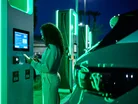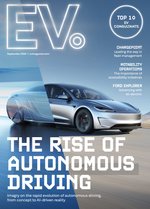Tata Consultancy Services addresses Car Rental Shift to EV

Many industries have embraced the shift with determination and foresight as the world accelerates towards transitioning to EVs. However, the car rental industry faces unique challenges. The industry is projected to reach a staggering US$104.40bn globally by the end of 2024 and provide livelihoods for approximately two million people globally. The challenges demand a complete overhaul of traditional business models, as the transition to EVs brings higher upfront costs, lower resale values and the urgent need for a robust charging infrastructure.
Adapting to a New Reality
Transitioning to EVs isn't just about swapping out combustion engines for electric ones; it's about reimagining the entire car rental industry from the ground up. Michael Hurwitz, a future mobility and energy expert at PA Consulting, says, "the car rental industry needs to be smart about charging. Efficient vehicle turnaround is crucial and the time required to recharge EVs presents a real challenge."
To navigate this shift, the car rental industry must go beyond acquiring new fleets and invest heavily in retraining their teams. It means equipping employees with knowledge of EV-specific maintenance and the nuances of handling first-time EV users. Chrissy Taylor, CEO of Enterprise Holdings, highlighted this during a LinkedIn Live interview: "The first step is educating our team. Then, we need to bring solutions to the market that offer a great customer experience. Our customers share the same anxieties about EVs that we do. We can't roll out EVs without reliable charging infrastructure; we all know that's a big challenge. That's why we're investing in EV charging infrastructure-figuring out what that looks like and what it means for us."
Ved Sen: From 'fortunate accidents' to leading innovation
Ved Sen, Head of Innovation at Tata Consultancy Services (TCS), brings a wealth of cross-industry experience from both the public and private sectors, tackling next-generation problems through technology, design thinking and strategic models. Reflecting on his journey to TCS, Ved admits a series of "fortunate accidents" led him here—especially since, as he humorously points out, "there was no such technology when I was getting my education."
TCS, a global IT services and consulting leader, has been guiding top companies through digital transformations for more than 56 years. Renowned for its agile delivery model and cognitive-powered solutions, TCS operates in 55 countries with a team of over 601,000 skilled consultants. Part of India's Tata Group, TCS reported US$29bn in revenue for fiscal year 2024. Beyond business, TCS is committed to sustainability and community impact, earning spots on prestigious indices like the MSCI Global Sustainability Index and FTSE4Good Emerging Index.
Rethinking the Business Model: A New Ecosystem for EVs
The car rental industry cruised comfortably for years within a stable and predictable business model. But the rise of EVs is now upending that comfort zone, forcing companies to reconsider everything from fleet operations to customer engagement. Ved summarises the situation with refreshing clarity: "The car rental industry has to rethink their ecosystems completely. The entire network is in flux." He quickly points out that adaptability is crucial in this rapidly shifting environment: "They need to stay nimble and ready to pivot as things evolve."
Ved doesn't just stop at identifying the problem; he champions a more collaborative approach to navigating this transformation. "We need to broaden the circle," he urges; instead of treating the EV transition as an isolated issue for the car rental industry, Ved advocates for a cross-industry effort, pulling in insights from diverse sectors. He highlights the healthcare industry as a prime example where collaboration has already unlocked significant advancements-an approach he believes could be just as valuable for the mobility sector.
Expanding the problem to find the solution
As with any industrial revolution, adapting to sweeping changes in technology, society, economy and culture requires vision and a willingness to evolve. Ved approaches this challenge with a broad perspective, suggesting that instead of treating the shift as a problem limited to the car rental industry, it should expand to involve a wider network of stakeholders.
"The challenges of transitioning to EVs shouldn't rest solely on the car rental industry," Ved asserts. He believes a collaborative effort is needed, encompassing original equipment manufacturers (OEMs), city councils, airport operators, infrastructure developers and others. Ved argues that by uniting these key players, “the industry can devise a more robust and sustainable solution to this complex transition.”
Shifting mindsets: The power of collaborative ecosystems
By inviting multiple stakeholders to the table—whether from the automotive industry, energy sector, or local governments—complex challenges like the EV transition can be addressed more holistically. Ved believes, “no single entity has all the answers, but together, they can create a comprehensive solution.”
Regulation as a catalyst for change
As the car rental industry navigates the transition to EVs, regulation will be crucial in guiding and supporting the change. Ved notes that evolving regulations, particularly around data sharing, disclosure requirements and risk management, could provide the framework needed for a smoother transition. "So I think this one route to change is through regulation," Ved says. "As regulations change in terms of what you need to disclose, what you need to carry, what kind of fail-safes you put in place for all the new risks you've got."
Navigating the new frontier of real-time data sharing
In the fast-changing world of EVs, the importance of real-time data sharing between companies is skyrocketing. Ved sees this as both a hurdle and a game-changing opportunity. "We're exploring how to enable companies to share data through innovative approaches like data marketplaces," he explains. In these models, businesses would contribute data to a third-party platform, where others could access it with permission. Ved is optimistic about this concept, which could redefine how companies collaborate in a data-centric landscape.
But there's a catch. Current regulations and data privacy concerns make sharing a tricky proposition. Ved acknowledges the challenge: "The mindset around data sharing is rigid and the legal framework is protective. Shifting that perspective while ensuring robust safeguards will be crucial." Despite these obstacles, Ved is optimistic, viewing this as an exciting new frontier for innovation in the industry.
The emerging charging infrastructure
One of the biggest hurdles in the car rental industry's shift to EVs is the availability of charging stations. Ved sees this as a strategic opportunity for the car rental industry to partner with or acquire emerging players in the charging infrastructure space. He suggests such collaborations could help shape the network essential for widespread EV adoption.
The move to EVs is transforming the traditional refuelling experience. Instead of a quick stop for gas and snacks, drivers now face 20-minute charging sessions, fundamentally altering the role of retailers and service providers. Ved highlights the challenge: "The forecourt experience needs rethinking—how can businesses make that 20-minute wait engaging or productive?" It's a complex equation, with retailers exploring new amenities and entertainment options while charging stations focus on smarter tech solutions. As these various players figure out their roles, a more integrated and engaging experience for EV drivers is beginning to emerge.
The potential is clear—everyone recognises the opportunity—but timing investments, managing infrastructure costs and predicting returns remain tricky. A big challenge lies in gauging how quickly consumers will embrace EVs and move away from combustion engines. The shift isn't uniform across regions, as Ved notes: "What works in London might not work in Manchester and Manchester is different again to Newcastle." He points to the Nordics, where the cultural and social commitment to EVs is much stronger. By studying how rental companies, charging networks and retailers are evolving in places like Norway, we can glimpse what the future of electric mobility might look like elsewhere.
In the end, the key question in this transition is determining who takes the lead in addressing the challenges of EV adoption in the car rental industry. Ved frames it nicely: "You have the trailblazers willing to take risks and weather the storm, the cautious players who prefer to move at market speed and, of course, the fast followers." Each approach is valid, but they demand different strategies. For instance, some companies may segment their markets to tackle specific hurdles, like range anxiety among holiday travellers venturing beyond city centres where charging options are scarce. Others might focus on city breaks with strong infrastructure, allowing them to tap into specific market segments more effectively. Ultimately, how each company positions itself in this evolving landscape could be the difference between leading the charge or playing catch-up.
To read the full story in the magazine click HERE
**************
Make sure you check out the latest edition of EV Magazine and also sign up to our global conference series - Sustainability LIVE 2024
**************
EV Magazine is a BizClik brand


